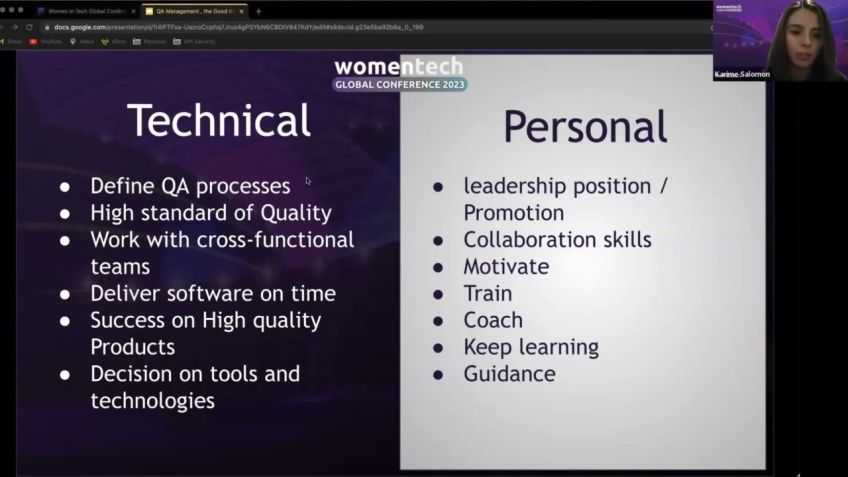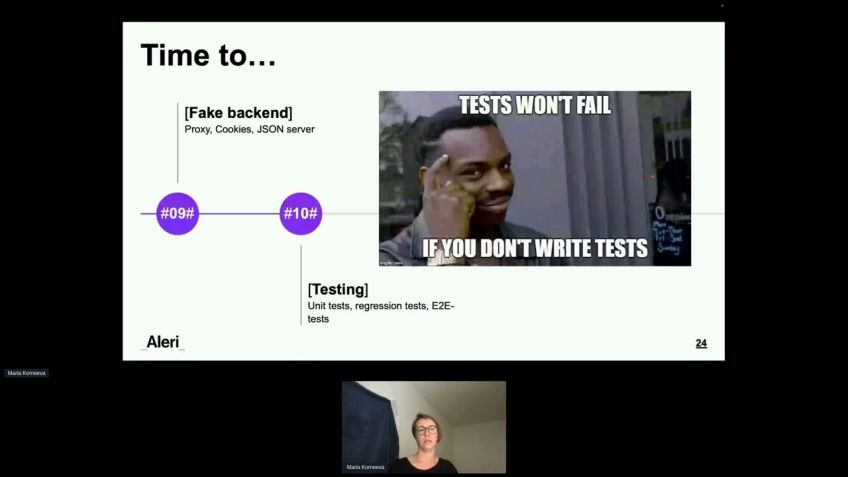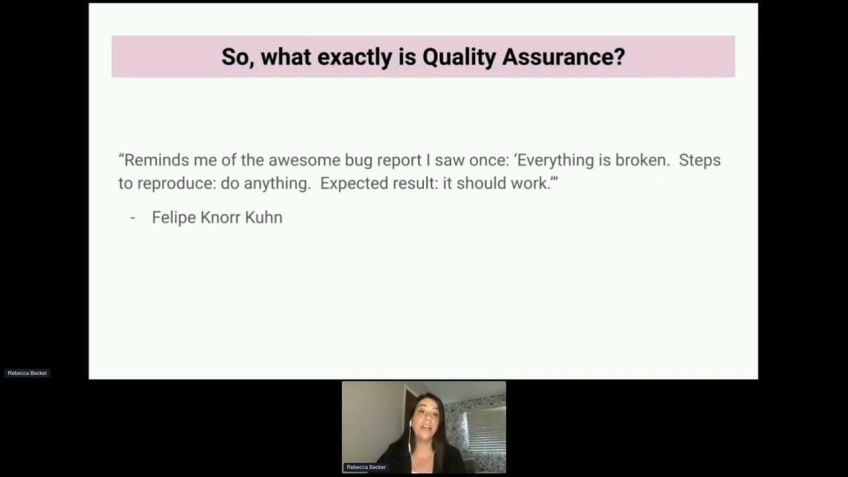We Need To Talk About Quality
Reviews
Why We Need to Talk About Quality in the Tech Industry
Good morning, readers! Today's focus will be on a topic of high significance in the tech arena - quality. My name is Nicola Martin, and I have been exploring this space for approximately 20 years. Let's delve into this topic and understand why we need to talk about quality.
About
With over 20 years of experience in tech, I have taken on roles that centre on quality - Quality Assurance (QA), business analysis and project management, among others. I have dedicated the majority of my career contracting within the quality space, focusing on industries like finance, Artificial Intelligence education and media. At present, I serve as the head of quality at a leading tech company, IDA.
My External Roles: A Focus on Equity and Inclusion
Beyond my regular tech roles, I devote my time to supporting inclusivity in the tech industry. I am the head of education and mentorship for Women in Tech Global UK and the Inclusion Officer for the British Computer Society. I work with their committees, mentor for the Association for Black and Minority Ethnic Engineers UK and often participate in events to discuss issues on diversity, inclusion, and quality in the tech industry.
Defining Quality in Tech
According to the ISTQB, quality refers to the process of establishing and directing a quality policy, objectives, planning, control, assurance, and improvement for an organization. It generally comprises three areas: quality management, quality assurance, and quality control and improvement. For me, quality exists as a culture within a company. It's a mindset that must be embraced by every member of the organization and especially championed by leadership.
Importance of Quality
Why do we need to advocate for quality? It helps foster a quality culture mindset across the company. Frequent conversations on quality inculcate it into the foundation of the company's practices, making it a natural, collaborative effort instead of a chore. It also aids in cultivating core values, focusing on customer satisfaction, fostering collaborative working relationships, understanding risks, and garnering leadership support for quality initiatives.
The Culture of Quality
The culture of quality encourages communication about quality across all teams in the organization. It integrates quality across the organization, fostering core quality values that can adapt to growth. Essentially, discussing quality is the responsibility of everyone – from the CEO, CTOs, engineering teams to information management teams. This collaborative approach ultimately enhances the quality of the final product.
Quality Discussion Topics
Consider talking about standards like ISO 9001 and ISO/IEC 25010, introducing a quality policy, creating a test policy, and focusing on training and mentoring for continuous improvement. Avoid working in silos and aim to create cross-functional teams for focused discussions on quality. Also, discuss ways to automate as much as possible for faster production.
Building a Quality Culture: Towards Better Quality Products
Cultivating a culture of quality is not easy, but it yields significant rewards. Frequent communication, regular feedback, setting checkpoints, and training sessions are actionable strategies to maintain the quality conversation in the organization. The emphasis on a quality culture contributes to the creation of quality products.
Conclusion
In conclusion, quality needs to hold a crucial part in your discussions within the tech industry. Reach out to your organization's QA or quality in-charge and be part of the change. Remember, the more champions we have, the easier it is to deliver the quality message. That's all for today! Questions are always welcome. Enjoy your day, and remember, quality matters!
Video Transcription
So good morning everyone. Um Today, um I'm going to be talking about why we need to talk about quality. I'll just start by introducing myself. My name is Nicola Martin. Um As you can see there, I've said that I love to talk about quality.I've been working in the space for about 20 years. So, um if you want to want to reach out to me afterwards, there'll be more addresses and things at the end, but you can find me on Twitter at Nicola L Martin. So, um I have about 20 years experience in tech. It's actually a bit more than that now. Um Just over, I think 21 I've worked in various roles um that involve quality. So I've been a Q A predominantly um throughout my career. Um and I've also been a ba a business analyst and I've worked in um project management as well. Um I have spent the majority of my time um contracting um with and about just under half of it actually um in permanent roles all within the quality space. Um all tech roles. My main industries that I've worked in are finance A I education and media all in tech teams um in those areas. And I'm currently the head of quality for a company called IDA in terms of my volunteering. Um I actually do quite a lot outside of work. Um So I'm head of education and mentorship for women in tech Global UK. So that's not the same as women tech. It's another group, women in tech Global UK.
Um Currently, we're working on um initiatives such as a global mentoring program. So I'll be looking after that from the UK side and I have a team helping me to do that and we also focus on um education. So going into schools and doing STEM events. Um I'm also an inclusion officer for the British Computer Society. So I work with two of their committees. I work with B CS Women and I also work with um B CS Special interest group in software testing as Q A in software testing is my main area of expertise. I'm also a mentor for the British Computer Society and I also mentor for the Association for Black and Minority Ethnic Engineers uh UK. I'm also a speaker and mostly you'll see me as a Panelist and I take part in events and talk about all things quality um and also talk about diversity and inclusion as well. So let's start. So I wanted to start off by really talking about what, what quality is. So I, I found a definition now there are many floating around. Um it obviously depends on what approach you're, you're, you're you're wanting to take.
So for me, I've taken the ISTQB definition as that seemed to be the most um clear cut one. So the process of establishing and directing a quality policy, quality objectives, quality planning, quality control, quality assurance and quality improvement for an organization. And mostly when you hear people talk about quality, it's, it's three areas. So it's usually quality management. The main one that you'll hear in tech teams is Q A. So quality assurance and also quality control and improvement as well. That should be a part of the conversations that are being had. Um But mostly you will hear about quality management and quality assurance depending on the size of your organization, depending on how many people you have within a team, you might be the only tester in, in an organization. And so you would be responsible for all of these things.
Um So what is quality, so bearing in mind, I've just given that definition, which is, you know, it, it encompasses everything um from the top down, really what quality is to me is. It's, it's a culture. So you have to have a quality culture within your company. It's a mindset. So everybody who has some level of um input into quality um has to have a quality mindset and that has to be either something that you naturally have or something that you learn. Um it must be championed by leadership. And that's really important because they need to support initiatives around quality and to support um quality teams to make sure that um you know, they can then support other teams uh within maybe an engineering space or in the organization as a whole. And quality must be adopted by all teams. Uh That's really important because having one team focused on quality is not going to give you overall quality on your products, um or your deliverables. Why is it important to talk about quality? So, as I've said before, it's about the quality culture. So it's really important to talk about um the culture of quality because then it sets this mindset that I've also mentioned across the company. If you're constantly having these conversations, it embeds it and it makes it a natural thing that doesn't seem like a chore. Um It doesn't seem like you're uh you know, trying to make sure that everybody's following loads of processes or anything else, it just becomes a natural thing.
So it's really important for companies to set core values and make sure that everybody understands what those core values are to have a focus on customer satisfaction. That's really important as well because um you know, feeding back into what we're developing in terms of requirements for our core systems should be based um a lot of the time on the customer satisfaction that's coming back. So once you start to build clients, you need to start to look at the customer satisfaction. Um And you know, the feedback from customers, having collaborative working relationships across teams is really important for keeping quality at a high level. Um Ensuring that there is um conversations around risk and you know, dependencies that's really important. If everybody's working in silos, it just won't work. Um As I've mentioned before, having leadership support for quality initiatives is really important for setting the culture of quality.
Um You know, it ensures that everybody understands that it's expected that they follow these initiatives. It's expected that they play a part in it. It also encourages people to speak up and to talk about quality, even if it's not something that they're usually used to talking about.
Um The quality of culture also encourages the communication about quality. As I've just said, you know, it's important not that it's not just your quality slash Q A team slash test team or your single tester that talks about quality, but that it's something that's communicated across um the company. I mean, I'm I I could even say that, you know, there are teams outside of tech teams that are involved in it. So, you know, you might have a customer success team or a sales team, marketing, they should also care about quality too. Um And then, yeah, as I've mentioned, integrating the quality across the organization that's really key to ensuring that you have this culture of quality um you know, and making sure that new people coming on board, understand that um and that people within different teams are able to feed into that process.
So it's not set in stone, but it's something that you have a baseline for like the, the core quality values. And then, you know, over time as your company grows and expands, you can potentially um you know, change those or adjust them as you grow. So who should be talking about quality? So I've just dumped a load of roles here in essentially just trying to think off the top of my head, the people who might be involved in conversations about quality. Um I even have AC O role here. Um You know, anybody who's involved in information management, anybody involved in sea level. So, um you know, any um VPs, for example, could potentially have some say in, in quality and it's really important to open up the conversation to everybody in the company. So CTO S um and then of course, your engineering teams, it's really important to encourage developers and engineers to have a say in, in, you know, how quality works within the company. Um And you know, feeding that back into processes and making regular changes to processes to ensure that everybody's on board with them. Um and following them. So, you know, as I've just said about all these roles, quality really is the responsibility of everyone. You should really aim to have more diverse, more cross functional teams focusing on quality because that ultimately improves the quality of the product. We need to try and move away from more siloed quality.
Q A teams and development teams, engineering teams that don't all talk about quality of product and don't all care about the quality of the product. You might have some teams where their focus is delivering on time. Yes, that is the focus of a quality team as well, but not at the um you know, not to compromise on the quality. So having more diverse cross functional teams and having people within maybe if you only have a Q A team, having people within your team with cross functional skills is really important, especially if you say, for example, follow agile processes um and ways of working that's really important.
And um you know, obviously in a Q A team in an agile environment, you're working on automation, hopefully. Um and you know, these things require you to be technical. So having cross functional teams focusing on quality, as I say, again, it's really important for the quality of the product and to ensure that the right conversations are happening with the right people in the. So what should we be talking about? So the first thing I talked about here is probably the top level and something that most engineering teams don't get that involved in but possibly should. Um So we have standards um that there are tons of them out in the world. Um Lots of companies doing different standards, but mostly if your company follows uh has a Q MS system in place, a quality management system, they'll likely be um following um IO 9001. And the newest version is 2014 to ensure that across the board, they have the right processes in place, the right documentation and that teams understand that quality management process. Um and also that um where they need to be updated, that they're regularly being audited on that um internally and then maybe once a year you have an external audit um where you can be certified, um your company can be certified as having passed that uh standard.
Then you have to think about product quality and maybe you might as a company think about looking at um the ISO I EC2 5010 standard, which um again, will give you an overview of um the product quality that you should be aiming for and it breaks it down into pillars and talks about functional and nonfunctional quality and the areas that maybe you should be focusing on.
So if you're a small company don't be scared of standards because actually they can help you to grow and improve quite quickly, you can move from a, a small to a medium company if you have this kind of rigor in place. Um It's not scary. It doesn't mean that you're getting rid of autonomy um you just make sure that you have a layer of good practice over the top. So it's not just for regulation, you should potentially look at standards as a way of um introducing good practice to your teams. And it's something that you should talk about with the wider tech teams within your company. Introducing a quality policy is always a good idea because that then piggybacks off the um the Q MS. Um And also if you're implementing any of the good practice from any of the other standards around quality, um then having a quality policy in place, ensures that you're following that and that your company is um ensuring that, you know, at a base level, they have this good quality in place.
Um ensuring that there's a test policy around Q A and that all the teams and all the people involved in testing, which is quite a wide amount of roles. It's not just test teams um that they understand the test policy and that it's um involves uh you know, just a core set of rules for how you engage in terms of testing, but also that you have some flexibility and it grows and it can change. And that's the same with the quality policy as well. Flexible processes are always important for quality teams. OK? I keep going on about it, but cross functional ways of working there, they're the things that you should be talking about working in silo is no good cross functional ways of working, really help teams to work at their best to produce the best product um and ensuring that you have the right skills within your teams to ensure that you can carry out these quality practices.
So, training and mentoring across teams is, is um a, a big thing and I'm actually really passionate about mentoring and training, but mostly mentoring. Um And I would advise if you don't have one and you work in quality to consider getting a very good uh mentor. Uh I say a good mentor because there are a lot of mentors out there. And you know, it depends on what your wants and needs are in terms of goals and short term and long term goals. But you should really consider getting a mentor because uh or finding a mentor because they can help you to reach your quality goals as well. If you set those out as some of the things that you want to achieve during your mentoring journey, you should also talk about as tech teams or as organizations the way to improve quality. So always having these checkpoints in place where you can look at improving quality, whether it's through testing. So I improving quality by bringing in new ways of testing. Um looking at your testing pyramid to see whether or not it's still serving, you know, your product. Um Is it too um manual oriented? If it is, then you need to uh think about automating and that's not just tests, but that's um processes as well.
So if you can automate as much as possible, that will help you to deliver and improve quality with built in check gates and quality gates. Um and also ensures that you deliver product to um to production faster, which is always a great benefit. So, in conclusion, um I've talked a lot about quality culture. The path to it is never easy. You have to continually keep lines of communication open, how you do that have monthly or quarterly checkpoints, where you gather the key players within teams together to ensure that you're getting feedback, to ensure that you're still following the right quality path, to ensure that the culture is still something that everybody's passionate about, get feedback, send out surveys.
If you're that mature, you can do surveys. Um You can also do quality surveys as part of one of the standards that I've mentioned to 5010. There are also um you know, questionnaires that you can send around to every team and start to establish uh an internal survey that maybe you do once a year that um tells you what the quality levels of the system are in, in the, from the mindset of everybody who works on it.
So getting as many people to take part in that as possible, gives you massive feedback on whether or not you're approaching this in the right way. Keep the lines of communication open. It's really important as I've just said, you know, having these meetings at, at regular intervals or, you know, having sessions like brown bag sessions just to make sure that you're teaching and, and, and mentoring, um having a quality culture overall helps us to build quality products and it really does and I've stressed it all the way through this presentation.
But um you know, go back to your workplaces if you do work in quality, think about your quality culture and how you might improve upon that and how you might have a bigger voice um in, you know, these conversations, if it's not something that you normally get involved in, you know, if you reach out to whoever is in charge of your Q A or quality, I'm sure they'd be more than welcome to have your input because the more champions we have, the easier it is to make sure that we're, we're getting that message out and that's it.
Thank you. Um Any questions? Ok. Right. Well, I'll leave you all to it. I hope you enjoy your day. Thank you very much. Take care. Bye.






No comments so far – be the first to share your thoughts!